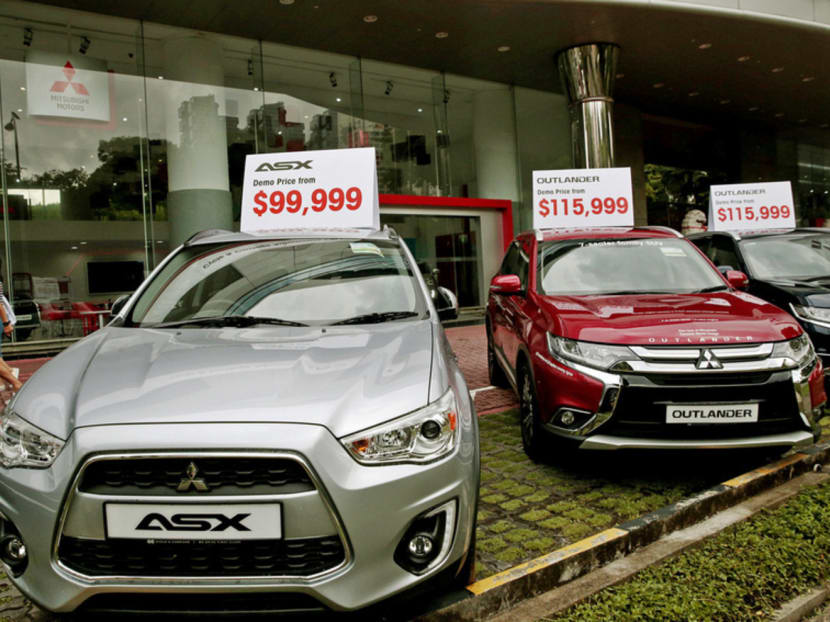Singaporeans feel the pinch despite continued drop in consumer prices
SINGAPORE — Mr Ernest Lim finds it harder to stretch his dollars these days.

A key factor cited for lower private road transport costs was the decline in COE premiums. According to UOB economist Francis Tan, however, lower car prices do not have a consistent impact on consumer prices compared with daily necessities, as buying a car is usually a one-off item. TODAY file photo
SINGAPORE — Mr Ernest Lim finds it harder to stretch his dollars these days.
“I don’t feel that there is any price drop in common goods ... On the contrary, some things are getting more expensive, such as cinema tickets, which have almost doubled in price over the years,” said the 35-year-old heartlander.
Like many other Singaporeans, Mr Lim finds cold comfort in the news that consumer prices fell for the 18th consecutive month in April, the longest stretch of decline since Singapore’s independence in 1965. Indeed, items such as food, public transport and family entertainment have actually become more costly.
Mdm Sally Ng, a 64-year-old retiree, said: “These days, everything is getting more expensive. Taxis are expensive, food prices are rising. I don’t see much of the low consumer price effect despite what was announced recently. In the past, probably five years ago, a bowl of noodles cost S$2.50. Now you hardly can get that price anywhere. The price of noodles now is around S$3.50.”
In April, the all-items consumer price index (CPI) fell 0.5 per cent year-on-year, moderating from the 1 per cent decline in March. Accommodation costs fell by 0.9 per cent, slowing from the 3.2 per cent drop in the previous month, reflecting the soft housing rental market. However, this is moderated by the low base associated with the disbursement of service and conservancy charge rebates to households in the same month last year.
A bigger drop in petrol pump prices contributed to a 7.1 per cent fall in private road transport costs for that month, extending the 5.9 per cent decline in March. Yet, Mdm Ng, who drives her own car, noted that there seemed to be no change to petrol pump prices.
“They say oil prices have fallen but I still pay the same amount of S$100 a week on petrol, even though I now travel less as I am retired. ”
Another key factor cited for lower private road transport costs was the decline in Certificate of Entitlement (COE) premiums. The Monetary Authority of Singapore Core Inflation, which excludes the costs of accommodation and private road transport, edged up to 0.8 per cent in April from 0.6 per cent in the previous month, mainly due to higher services inflation as well as a smaller decline in electricity tariffs.
The disparity between what the headline number says and what the man in the street feels is down to composition and weightage of the items in the CPI basket, economists explained.
“In the CPI basket, public road transport costs, such as buses and taxi fares, have risen,” said United Overseas Bank economist Francis Tan. “Meanwhile, education costs are also on the increase, such as tuition fees and textbooks.”
Mr Tan added that food prices, including those of cooked food, are on the rise as well, while food prepared at home is also rising but at a milder pace. “However, these items are a smaller portion compared to larger-ticket items like houses and cars. That is why, overall, headline consumer prices have been on a downtrend,” he said.
“Most Singaporeans own their own homes and hence will not be impacted by the softer housing rental market. As for cars, the purchase of a car is usually a one-off item that will last for years, so lower car prices do not have a consistent impact compared to daily necessities,” he added.
ANZ Research economist Ng Wei Wen said the current disinflationary period in Singapore, notwithstanding some likely distortions in May, is in the process of bottoming out.
“However, any inflationary bounce is likely to be muted as the economy’s headline inflation remains entrenched in negative territory, despite the nearly 25 per cent increase in Brent crude price and almost 10 per cent price jump in agricultural commodities since end-March,” he added.





